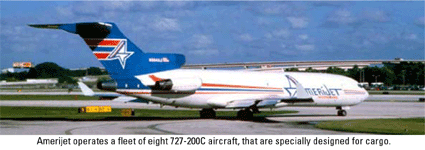 Offers new MIA ramp facilityBy Karen E. Thuermer, AJOT
Offers new MIA ramp facilityBy Karen E. Thuermer, AJOTIn business for 35 years, Amerijet International, Inc. is an old timer to the Miami area. But the full-service multi-modal transportation and logistics provider is certainly not stuck in outdated ways.
Indicative of its desire to continually improve its services, in August Amerijet opened a new 96,000 square foot ramp facility at Miami International Airport (MIA) that involved relocating its import operations out of its 230,000 square foot facility at the Airport Executive Center.
“At one point we had a small facility on airport at MIA and gave that up,” explains Warren Kroll, Amerijet managing director. “The 230,000 square foot facility is about two miles from MIA, which removes us from some of the airport’s congestion. The downside was we had to truck our freight to our airplanes that were ramped at MIA. When we got the opportunity to occupy the former Federal Express facility on the ramp, we took it.
The airport facility affords Amerijet the ability to service its airplanes more efficiently and effectively. Customers involved in imports can now also get a rapid release of their cargo. Located in an area known as Cargo City at MIA, the new facility includes approximately 28,000 sq. ft. of office space with the remaining 68,000 square feet devoted to warehouse and ramp facilities. This location provides ramp access for Amerijet’s flight and maintenance crews, as well as direct offloading of cargo. The new location also is where South Florida customers will now pick up all imports.
“This is especially important for our perishables items: fresh seafood and flowers that come in from the Caribbean and South America,” Kroll says. “This way these products do not have to take truck rides to get into the chiller facilities.”
Outbound cargo continues to be processed at the company’s Airport Executive Center facility.
“Here, truckers can bring freight, which is general cargo from all of our domestic stations that include New York, Chicago, Los Angeles, Houston, New Orleans and Atlanta,” he says. “All of that cargo comes by truck to our facility in Miami in addition to the traffic that we handle at our Miami gateway. Many of our forwarders move freight to Miami, tender it to us in Miami and others tender freight to our domestic stations which is then transferred to Miami. All that freight is received, processed and prepared for shipment, then transferred to our new facility ready to load onto the airplanes.”
Ft. Lauderdale, Florida-based Amerijet operates offices all over the world. Among its major destinations are North, South and Central America, Mexico, and the Caribbean to where the company offers direct service. These markets are very important to the company, serving 37 destinations directly.
“We got started in this market as an air ambulance company, then migrated into cargo. We were the original carrier to the Caribbean for Purolator Express then ventured into heavy cargo,” Kroll says. “We found certain markets in Latin America were very under-served. We still believe certain markets in the Caribbean are under-served. Therefore, we are the prominent cargo carrier in and out of those areas.”
Much of the Caribbean-bound freight Amerijet handles from the United States is for the hotel and cruise industry. “We replenish cruise ships that arrive in islands like St. Maartens and Barbados,” he says.
In markets like El Salvador, Guatemala, and Honduras, Amerijet will fly in primarily raw materials and fly out finished goods, primarily clothing.
The company operates a fleet of eight 727-200C aircraft, which are specially designed for cargo. Amerijet also wet leases a 767 aircraft, one 760 aircraft, and, around October 1, it will bring in another 767 wide body.
Shipments to and from Latin America are not always balanced. Kroll explains that much depends on the time of


